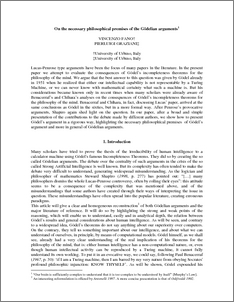vincenzo, fano and pierluigi, graziani
(2011)
On the necessary philosophical premises of the Goedelian arguments.
[Preprint]
![[img]](https://philsci-archive.pitt.edu/style/images/fileicons/application_pdf.png)  Preview |
|
PDF
GODEL_FANO_GRAZIANI_Lungo_Ultima_versione.pdf
- Draft Version
Download (254kB)
|
Abstract
Lucas-Penrose type arguments have been the focus of many papers in the literature. In the present paper we attempt to evaluate the consequences of Gödel’s incompleteness theorems for the philosophy of the mind. We argue that the best answer to this question was given by Gödel already in 1951 when he realized that either our intellectual capability is not representable by a Turing Machine, or we can never know with mathematical certainty what such a machine is. But his considerations became known only in recent times when many scholars were already aware of Benacerraf’s and Chihara’s analyses on the consequences of Gödel’s incompleteness theorems for the philosophy of the mind. Benacerraf and Chihara, in fact, discussing Lucas’ paper, arrived at the same conclusions as Gödel in the sixties, but in a more formal way. After Penrose’s provocative arguments, Shapiro again shed light on the question. In our paper, after a broad and simple presentation of the contributions to the debate made by different authors, we show how to present Gödel’s argument in a rigorous way, highlighting the necessary philosophical premises of Gödel’s argument and more in general of Gödelian arguments.
Monthly Views for the past 3 years
Monthly Downloads for the past 3 years
Plum Analytics
Actions (login required)
 |
View Item |



